- Latest articles
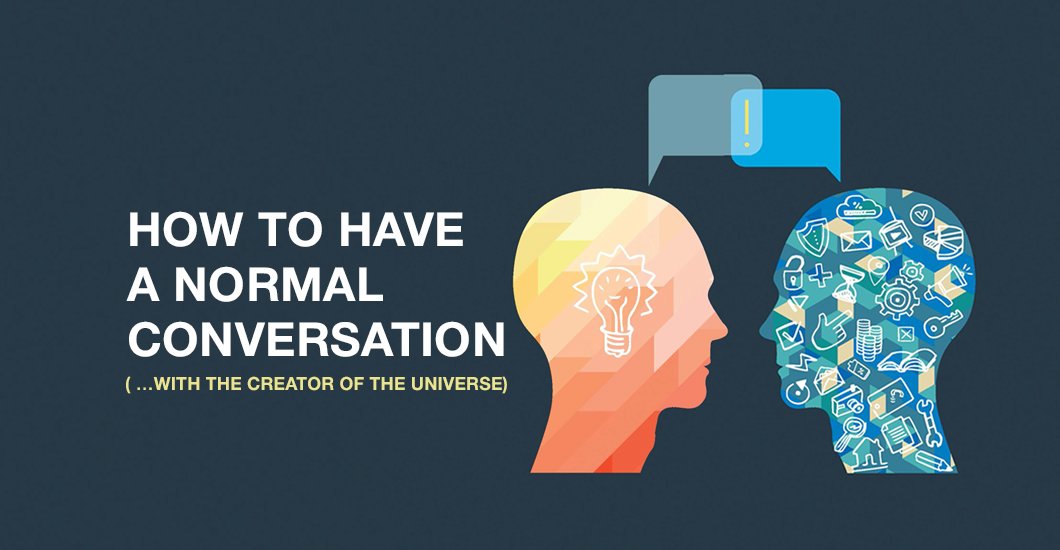
Scenario:
You have a job offer and you are not sure whether or not you should take it. You need a little help deciding and so a natural thing to do is call a close friend. The two of you talk it over; your friend helps you weigh the pros and cons and you get off the phone call perhaps still not 100% certain of your decision but you feel like you have at least a little more clarity on the matter.
Now, what if instead of calling your friend, you just sent a brief text: “Have job offer. Send flowers if you think I should take; disregard if I shouldn’t.” Crazy as that sounds, is this not sometimes how we approach our prayer when faced with a big decision?
Of course, God is more than just a good buddy with helpful advice—He is the one who actually KNOWS how things will turn out whether we choose one road or the other. It would be so helpful if God could just beam down a ray of light illuminating which path we should take at every major crossroad, but often that is not the way it works.
The Way It Works
As my father-in-law puts it: “God is not a cosmic slotmachine.” Prayer is a conversation—a conversation with the Creator of the Universe, but a conversation nonetheless. When you are faced with decisions, however big or small, God wants to talk with you about them. How else are we supposed to grow in relationship with God other than talking through our thoughts and feelings with Him? God put that brain in your head and it is weighing all those scenarios. Your faculty of reason is one way in which God talks to you. Another way He talks to you is through your desires and longings.
“Take delight in the Lord, and He will give you the desires of your heart” —Psalm 37:4
When that Psalm popped into my head while I was driving one day, I nearly pulled over so I could look it up to be sure it was actually in Scripture. Did God really promise me the desires of my heart? Is not prayer and this whole Christianity thing supposed to be about conforming my will to His? Of course it is, but the Christian life is not meant to be a drudgery of “I’m doing this because God says so.” It is supposed to be a joyful union of our will and our desires to the Creator’s, so that we can confidently proclaim with the Psalmist, “Take delight in the Lord, and He WILL give you the desires of your heart.”
Our desires and longings are another way that God reveals Himself to us. If this sounds controversial it should not, because it is relatively simple to keep in check—if my desires are immoral or somehow not keeping with the teachings of the Church, then they are not of God, plain and simple. But, if I am weighing two options—neither of which appear to lead me away from God and His church—and one stirs a longing deep within me or, conversely, maybe one produces feelings of anxiety or just an overall sense of not sitting right, then perhaps those feelings are God speaking to me.
“Ask a Sign of the Lord Your God” —Isaiah 7:11
I am all about praying novenas and being specific in prayer intentions. Asking for signs is not necessarily a bad thing (it is actually Biblical!). However, asking for signs is never a stand-alone thing. God will give you signs, but only in the context of a relationship and as the result of a conversation. In fact, you probably will not even recognize the signs God sends your way if you are not in the habit of talking to Him.
So start talking! Regularly open up the Scriptures to get to know God and to familiarize yourself with His voice. Spend regular time in silent, personal prayer. God wants to help us in both the big decisions and the little things—not as some guidance counselor, but as the most important person in our lives.
'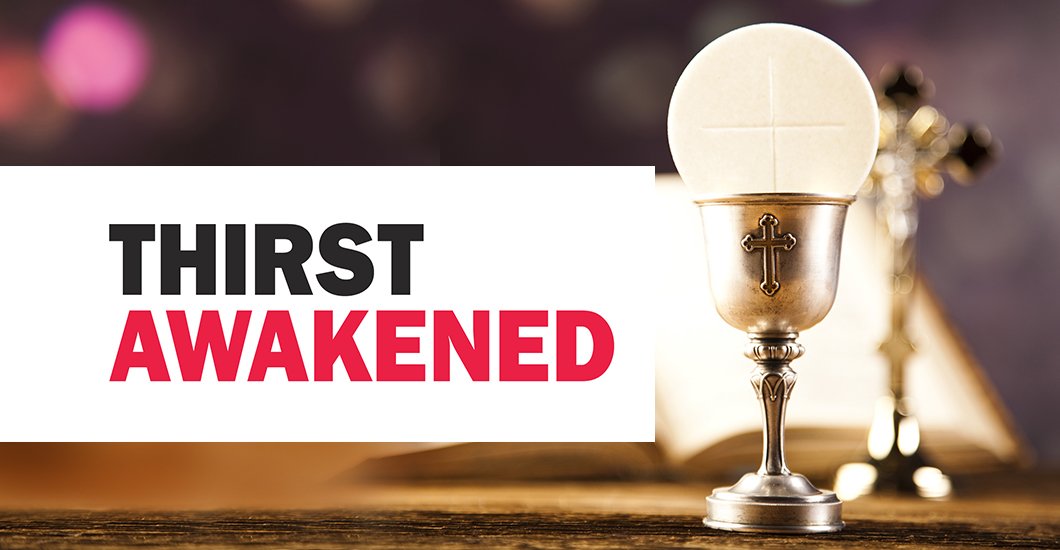
Two steps into the sanctuary and I could feel a surprising weight. It was as if the air was pushing down on my body. The smell of lilies filled the medieval church and evoked memories of Easter, water and fire!
My eyes searched the ornate altarpiece for the famous Eucharistic miracle of Santarem. Since 1247, the host of Jesus’ body has bled.
High above the altar in a small golden monstrance, the host of Our Lord is on display. A golden tabernacle protects this divine miracle.
Almost as soon as I found a place to kneel, relieving the pressure of the air, the small golden door on the tabernacle closed. My knees ached against the bare wooden kneeler and my heart sighed. Could I not get closer? Could I not see with more than my heart? Like all good and true desires of my heart, God was about to exceed my expectations and delight both my eyes and my heart!
Adoration of God in the Eucharist proceeds from the belief/truth of the real presence of Jesus, body, blood, soul and divinity under the appearance of bread and wine. No reflection on the Blood of Jesus would be complete without recalling the mystical intimacy Saint Catherine of Siena had with Christ’s passion and blood.
Saint Catherine spoke incessantly of Christ’s blood. She asserted the need to drink in the grace of Christ’s blood and become “drunk” on the love poured out in the shedding of this Sacred Blood. In one rather remarkable gift of grace, she was permitted to drink the blood of Christ directly from His side!
Catherine, reflecting on her spiritual children, declared, “Indeed, they go into battle filled and inebriated with the blood of Christ crucified … they will pass through the narrow gate drunk, as it were, with the blood of the spotless lamb.”
By partaking in the blood of Christ, her thirst was awakened, not quenched. The more she drank of Christ, the more she desired. Her soul was intoxicated by the love found in Christ’s blood!
Almost in mid-thought, a Portuguese woman in broken English interrupted my contemplation of Saint Catherine. The woman bid my group of pilgrims approach the altar, revealing a side staircase. The marble floor surrounding the altar gave way to a set of wooden stairs. The walls inside the staircase were covered in religious art and statues of our lady and various saints were tucked into every corner. An eclectic assortment of religious items was displayed in glass cases. Somewhere from behind the wall men’s voices were suddenly raised in Gregorian chant.
I climbed the hidden staircase only to find another narrow metal set of stairs at the top. One by one each member of our group ascended and returned. No one spoke. No one looked at each other.
Finally, it was my turn to climb the narrow stair. Up, up I climbed and then I saw Him! Almost six inches from my eyes, separated by merely a pane of glass, I gazed on my beloved Creator. The consecrated Host (the same consecrated at every Mass) was before me! This time the Host was covered in bright red blood! The clotted blood looked as if today His flesh had been torn open for my sins! Torn open for love of me!
Stupefied, I said and did nothing! For several moments I forgot to pray or how to pray! His love on display, I felt the thirst and intoxication Catherine spoke about. So all I could do in that moment was to whisper through the glass, “I love You.”
'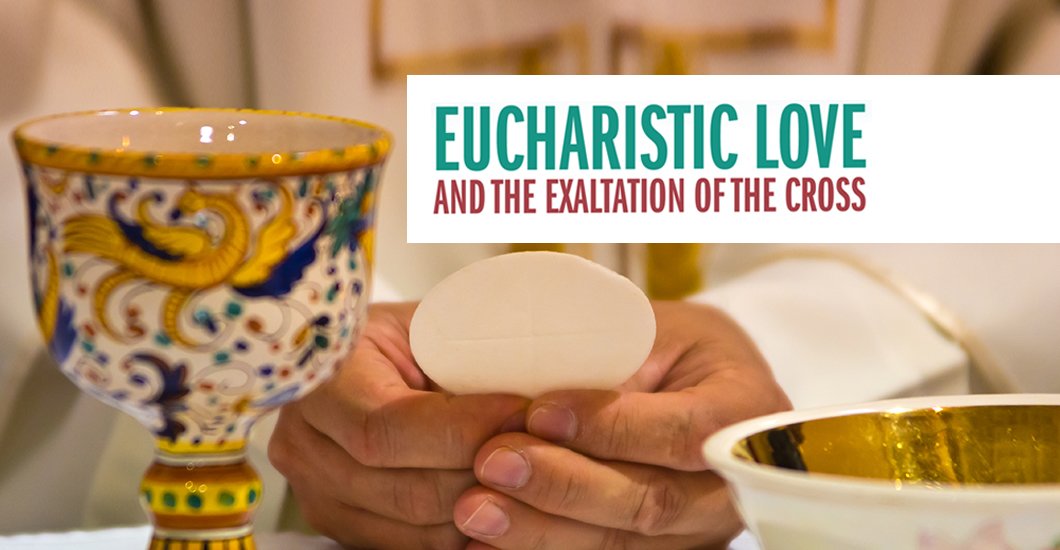
“It is cancer.” His voice trembling, my husband brought me the news of my new reality. Breast cancer, I have breast cancer. The thought just kept replaying in a terribly painful loop.
This is so hard to write about. I do not want any reminders of cancer or the painful treatment required to save my life. I do not want the physical reminders still left on my body in the form of scars and fatigue and lymphedema. I do not want to be reminded of what I lost and what I cannot now recover.
My body, both the source of life for so many children is also my betrayer. Having allowed this cancer to grow and spread, my body betrayed me. How can I see it any other way? Only, I need to see it differently. I must in order to heal.
How can the scene of such pain and suffering, my body, become in my eyes something worthy and good again? How can any such contradictions ever be reconciled?
For a time, I was resigned to ignore the problem. I hoped that with enough distance from the trauma of treatment that these feelings would go away. However, two years later, I realized that scars do not fade that much, especially to the eyes of the afflicted.
In fact, the more I tried to distance my thoughts from cancer’s assault on my body, the more distance I felt from God. I hated the physical part of His creation in me. I became disembodied in my relationship with God. Somehow in wanting to avoid the trigger for my pain (my body), I blinded myself to my faith’s mystical and unique ability to reconcile the contradiction of love and suffering.
Ours is a bodily faith, a Eucharistic faith, a faith that exalts the Cross of Christ. The Cross is the greatest of all contradictions; an instrument of both death and salvation. The source and summit of our faith is the sacramental reception of the Body and Blood of Christ. His Body and Blood upon the Cross. His wounded and scarred body. His sacred Blood that flowed for my sins. Ours is a mystical and yet also a bodily, tactile faith.
Saint Irenaeus of Lyons (AD 195) wrote, “He [Jesus] has declared the cup, a part of creation, to be His own Blood, from which He causes our blood to flow; and the bread, a part of creation, He has established as His own Body, from which He gives increase to our bodies.” According to this early Church father, it is the Eucharist that causes “our blood to flow” and “gives increase to our bodies.” A mystical marriage of the supernatural and corporal indeed!
Saint Irenaeus was writing before the third century to dispel the heresy of a disembodied faith–a faith divorced of the supernatural grace of the Eucharist and the Real Presence of Christ’s Body and Blood!
His words ring true today! Modernity promotes a spirituality devoid of the sacramental life. Modern culture is content to be “spiritual but not religious,” forgetting the heart from which the spiritual lifeblood flows–the Body and Blood of Christ in the Eucharist!
Even within the Church Jesus established, Catholics are ignorant of Our Lord’s True Presence in the Eucharist–Ignorant of Our Lord waiting for you in the sacrament of His sacrifice and love.
God who is all–powerful chose the Cross for our salvation. He could have chosen another form, right? He can do anything. Instead, Christ’s spiritual and physical obedience onto the Cross was God’s perfect means for our salvation, both a physical and spiritual surrender to God the Father.
The physical, the bodily has become a perversion in today’s culture. We separate the body from the soul in order to abuse one another. We deny the personhood/soul of the unborn to crush the life of the most helpless. This “freedom” is dehumanizing, dividing what God designed in His work of creation. We are meant to be body and soul and both are “very good” in His eyes. We are meant to be fully alive in Christ in body and soul. This life flows from the Eucharist.
My Lord Jesus gazes back at me from the Cross, as I adore Him in the monstrance. His spiritual and physical presence radiate Love. Knowing that He would ascend to the Father, my beloved left Himself as the Eucharist here on Earth. He left this gift of Himself for me to adore and receive into my body as food for my spiritual and physical life. In fact, because Christ holds my body in such high esteem, making it the means through which I am able to receive Him in the Eucharist, I am no longer disembodied. I have reconciled the contradiction of cancer in this body. I accept that which God loves and uses to come near to me–the Eucharist in me.
By the Cross of Christ, I have begun to reconcile physical suffering with love even as I struggle physically each day. Humanity cannot artificially divide body and soul or sacrifice and love. This is the lie of modernity and it separates us from God. God wants us body and soul just as He offers us His Body, Blood, Soul, and Divinity in the Eucharist.
The greatest mystery of our faith is that to experience His amazing nearness in the Eucharist is to truly possess Love Itself. The Gospel of John is clear; “He who eats my flesh and drinks my blood abides in me, and I in him” (John 6:56). He is waiting for you in the Holy Sacrifice of the Mass.
'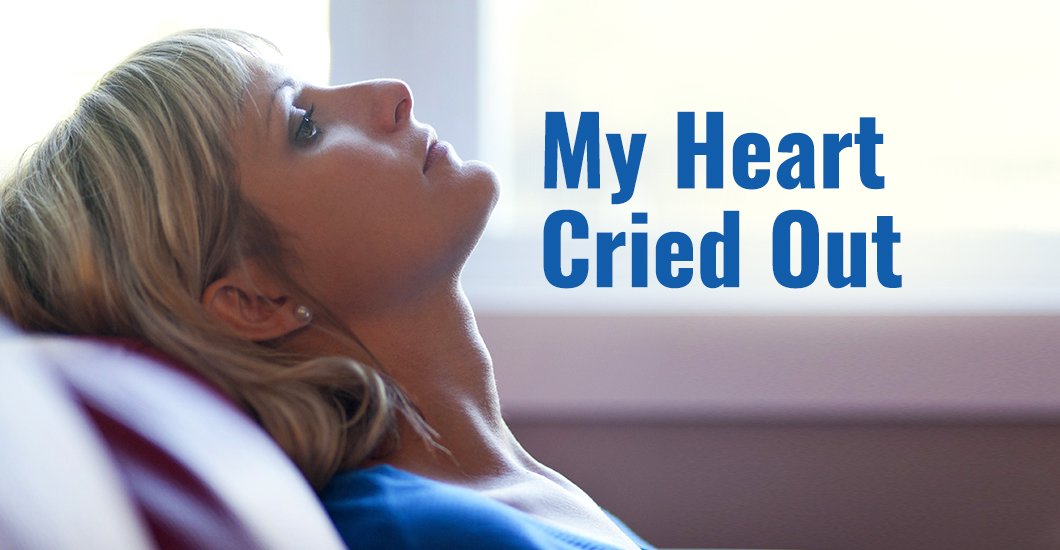
My heart cried out. Being a mom was the one thing I wanted most, and I had big dreams of a strong family and happy children. But I had lost the way. More than anything I wanted to raise my children to be good, to be morally strong, to love God with all their hearts. But how could that happen in the midst of changing endless diapers and making peanut butter sandwiches? How could it happen when I kept losing my patience and my temper? How would I ever find my way out of this confusion and be the mother I knew my children needed and deserved?
I needed my mom. I needed to call her and pour out all these troubles. Yet deep down I knew my situation was bigger than any help she could give. Then I thought of my other mother. Since reverting to the Catholic faith, I had been hearing and reading for the first time that Jesus’ mother is my mother, as well. The Church teaches that when, from the cross, Jesus gave Mary to Saint John (John 20:26-27) He was also commissioning her as mother of each one of His followers. My hero Saint Maximilian Kolbe had relied on her intercession with complete trust. I had met older women, mothers like me, who testified to her unfailing, maternal help.
So I called her. Right there in the living room, in the midst of the scattered Duplos and Tonkas and baby dolls. I stood there, helpless, completely overwhelmed by the task of not just raising my children but raising them to be good. “Help! I don’t know what I’m doing! I have such dreams and hopes for these children, but I don’t even know where to begin. How can I teach them to be good when I don’t know how to be good myself? Mary, please help me!”
Truthfully, this prayer was more a raw emotion gushing from deep inside me rather than words. It coursed through me and out of me, leaving me standing quiet and empty. In a moment it continued, simple and articulate, “Mary, please be the mother of this family. Treat me like your trusted oldest daughter whom you have left in charge of the younger ones while you are away. Show me what to do.”
I do not remember how long I stood there, but I will never forget the sense of peace that filled me. Nor did I forget through all the ups and downs of raising six children to return to this little prayer. “Mary, you are the mother of this family. Show your daughter what to do.”
From where did these words come? How did I move from emotions bordering on despair to this calm and clear request? Why would I ever imagine that the way to handle my very grown-up responsibilities was to be a child again myself? Years later, studying the “Catechism of the Catholic Church” (“CCC”) for the first time, I read this quotation from Saint Paul and I knew:
“The Spirit helps us in our weakness; for we do not know how to pray as we ought, but the Spirit himself intercedes with sighs too deep for words.” The Holy Spirit, the artisan of God’s works, is the master of prayer” (“CCC” 741).
Wow. This confirmed what I would have said if anyone had asked—that, yes, the Holy Spirit was present in that moment. Not only that, but the authors of the “Catechism” are telling us all that this is a characteristic action of the Holy Spirit. Since the early days of the Church this same Spirit has sighed with, has accompanied souls overwhelmed with troubles, interceded and directed their prayer.
There is more. One of the four parts of the “Catechism” is entirely devoted to the topic of prayer. The chapter on The Tradition of Prayer begins:
“Through a living transmission (Sacred Tradition) within the ‘believing and praying Church,’ the Holy Spirit teaches the children of God how to pray” (“CCC” 2650).
With awe, I can see these words lived out in that moment. Because of Church teaching (sacred tradition) and the life of a saint and the testimony of other members of my parish, I knew that I could turn to Mary for help. In a weak moment I did, and the Holy Spirit entered my confusion and fears. He, the Master of Prayer, re-oriented me and formulated my heart’s cry into simple instruction. Be a child. Let Mary be your mother and the mother of your children. He literally gave me the words to pray.
What leaves me in awe, however, is not the fact that some sentences in the “Catechism” help me make sense of what happened to me that day. Rather, I marvel that these words are in the “Catechism” at all; that theologians and teachers who have studied the ways God has acted in many souls and throughout Church history should characterize the instructions of the Holy Spirit in the way I experienced it. These words tell me that what happened to me was not some isolated event in suburbia. Far from being unusual, this is typical of the Holy Spirit. Through the Church and her members He truly does respond, comfort and teach each soul that cries out.
'
A Golden Trail to Follow
In the year 1897, when Sister Thérèse was on her deathbed, a young nun in charge of her care was helping the sick sister to arrange her habit. Sadly for Sister Thérèse, the nun inadvertently stuck a pin through her flesh. Did the Sister who was already in much pain complain or yell at her? Far from it, she suffered the wound and left the pin where it was until evening when Sister Celine found the veil over Sister Thérèse’s shoulder soaked in blood. No wonder, this dear Sister came to be known as Saint Thérèse of the Child Jesus, one of the greatest saints of modern times.
Be it big or small, Saint Thérèse’s little way is all about suffering with great love. During my college days I happened to read her autobiography “Story of My Soul.” Inspired by her heroic suffering and love for God, I was sitting in front of Jesus in the tabernacle. I felt deeply that I had not given Him anything. My life then was a mixture of joys and sorrows, but still I did not have a great suffering to offer. I lamented over this, crying out saying, “Jesus I want to suffer greatly for You! I want to take up that heavy Cross for love of You!” Little did I know what I was asking for … In my childish simplicity, thoughts of saints who suffered valiantly for Jesus lit a fire in my heart. In this great zeal I longed to accept everything from His hands.
Dark Night of the Soul
Years later, I had forgotten all about this solemn prayer. Halfway into pregnancy with my first child, I did not know that my trial of faith would soon begin. I was imparting faith to my baby right from the womb and spinning dreams of seeing my child grow in faith and love of God. I was the only ‘mom’ who could sing lullabies and pray over her tiny one pinned on all fours and strapped to all sorts of sophisticated instruments—some with never-ending beeps to show that she was alive, another to support her breathing. Her condition was oscillating and her fragile little body with loose skin at every joint was put through several blood transfusions. Even when doctors spoke hopelessly, I believed my baby was safe in the hands of Jesus. Such was the peace I felt in my heart even when darkness crept around. But it slowly turned into a nightmare when every report showed that her condition was worsening. The more I confided in God, the more was I tested … The doctors concluded that my baby is suffering from severe brain damage and micro-cephaly; this would affect her physical, mental and emotional development. I could not grasp the reason. Like any mother in this world I complained, cried and fretted, “Why my baby? You could have given me anything, but why make a little baby suffer?”
He Weeps With Me
Asking for more was easy. But when suffering did make its way, I was distraught. I wanted everything to end, but there was no turning back. I had to face it. The heavy cross I had asked for did not end with my first child born with disabilities. The chance of having a normal, healthy baby also slimmed down—every visit to the pediatrician and Sundays at Church became painful. The sight of children of the same age as my daughter, prancing around, looking at me and smiling innocently, broke my heart again and again. When babies nearby called their mommas, I sighed deep inside—far from calling, my baby does not know that I am her Mom.
In these distressing times, I could not pray. I was struggling to pray because all I could do was endlessly cry. One day as I sat before the image of the Sacred Heart of Jesus with the heaviness of a sick baby on one hand and a devastated family on the other, I saw tears flowing down His cheeks. His eyes were red with crying and tears were gushing in extreme agony. I was shocked! I could not look anymore. Why was Jesus crying? Did I do something wrong! I found the answer in the Bible. I found Jesus, who was moved in the depths of His spirit to see Mary and those around her weeping the death of Lazarus. Jesus wept (John 11:35) … Contemplating the impending fate of His beloved Jerusalem, which was about to crucify Him, Jesus wept over it (Luke 19:41) and the bitter tears He shed in the darkest hour before crucifixion (Hebrews 5:7) How comforting to know that Jesus really shares our feelings. The book of Isaiah prophetically speaks of Lord Jesus as “a man of sorrows and acquainted with grief” (Isaiah 53:3). Jesus still weeps with me in my sorrows. Often the pain felt in the heart can never be fully understood by those around, even by those close to us. But there is one who can truly know and feel what we are going through and He is Jesus. How often do we turn to Him in our sorrows? When we rely on friends and relatives to understand us, we forget about Jesus, Who is always beside us to console and comfort.
Dawn of Realization
Suffering is inevitable. Everyone has sufferings in life, in different ways. Once I heard a testimony by a chosen soul. He said the only child he and his wife received, after years of waiting, was bed ridden and could not look or even smile at them. His heart ached seeing other children playing around when his own son had several bouts of epileptic attacks a day. They went to numerous healing masses for a miraculous cure. The message they always got was the same: “This child is a gift from God and specially given to you because Jesus wants both of you in heaven with Him.” We miss being thankful for all the blessings and looking closely at all that is missing in our lives. If we gain everything in this world, what have we gained for Him?
When we feel that going forward is impossible, God’s grace makes everything possible. He sealed our family with His love and made it possible to see beyond our baby’s indifferent behavior, sudden epileptic fits, and her inability to even look or grasp anything, to stand or walk. Curiously, we found inner joy around her. In all that seems a weakness for the world, we found greater strength and this was possible only by God’s amazing grace. Her happy demeanor while we are praying is profound. She looks around, lauding with the invisible angels, and through her blabbering she sings the perfect hymn of praise. Our little one is a piece of heaven itself, a promise of where we are destined to be. She reminds us that God works for the good for those who love Him. Every new deed she does, no matter how trivial, is a great miracle from God and we thank and praise Him unceasingly for the great gift of His love.
The Joy in Suffering
Being a Catholic does not make us immune to sufferings but rather we must be ready to accept everything from His hands. Truly, suffering is a reminder: Jesus really wants us to be with Him! To the one who has never known the searing pain of even the prick of a needle, the sufferings of Jesus would only be knowing and never feeling from the depth. When sufferings come into our lives, let us rejoice like the saints who gladly accepted all for the love of Jesus on the Cross. The sufferings of this present time are not worth comparing with the glory about to be revealed to us (Romans 8:18). How fruitful our sufferings, big or small, when offered for the salvation of souls. In the words of Saint Thérèse, if we can pick a pin from the floor for love of God it can surely save a soul. All the pain and sorrows we go through when offered for those who do not know Jesus, for those souls lost in the darkness of sin and ignorance… how great a work of salvation we do. During her agonizing death, Saint Therese wrote, “I am not dying; I am entering into life!”
Let us remember this life on earth is a journey to heaven. At any moment, when the mist lifts up, we may find ourselves in that unknown, well-known land of heaven.
With joy in our heart, let us take the beautiful path leading to Heaven!
'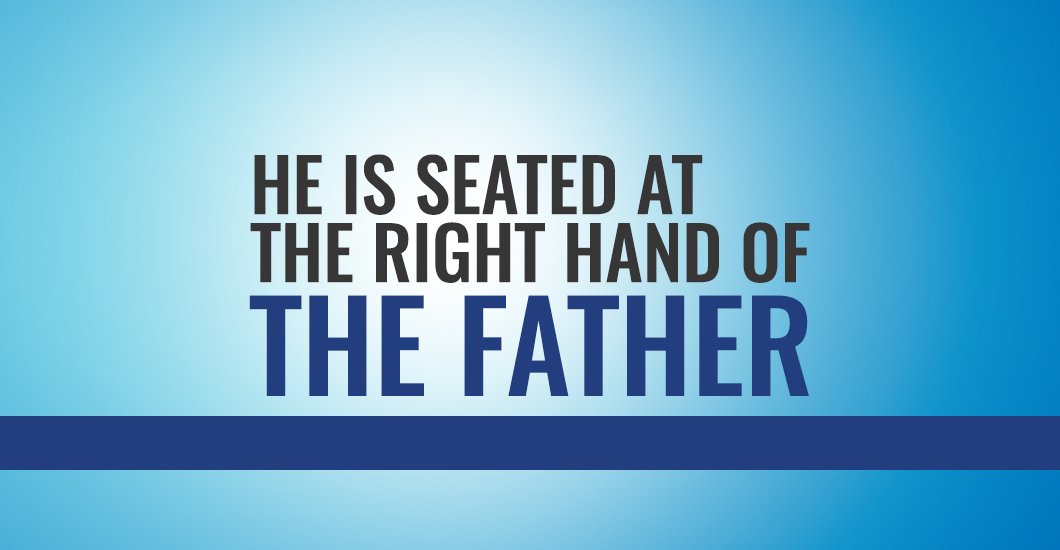
He ascended into heaven and is seated at the right hand of the Father.
Therefore… Let us lay aside every encumbrance and the sin which so easily entangles us, and let us run with endurance the race that is set before us, fixing our eyes on Jesus, the author and perfecter of faith, who for the joy set before Him endured the Cross, despising the shame, and has sat down at the right hand of the throne of God (Hebrews 12: 1-2 NASB).
I do not remember his name. Mike, I think. But I remember the last time I saw him. It was nearly forty years ago. I was standing on a street corner when his mom stopped at a red light. Mike sat in the passenger seat. He and I graduated high school the year before. I had not seen him since.
“Hey Mike!” I smiled and walked toward the car while the light was still red. “How are you doing? Haven’t seen you in…”
The rest of the words stuck in my throat as I glanced at his legs. The right was missing. Amputated just above the knee.
“WH-what happened?” I stuttered.
“Vietnam.”
The light turned green and I muttered something like, “Oh wow,” as they pulled away.
It is not hard for me to imagine the sorrow Mike’s parents have endured these many years for their son. I now have three grown children and I know how I would feel if any were so horribly wounded. When Mike and his parents sat at the dinner table, or watched television, or went for a drive, they had only to glance in his direction and see his missing leg. For the rest of their lives, their son’s wound will remind them of war’s horror.
Scripture speaks with somber regularity of our involvement in a lethal spiritual war (for example, 2 Corinthians 10, Ephesians 6, the Book of Revelation). We know that the Lord Jesus was a casualty of that war; He was wounded, suffered and died. But when He rose from the dead, the Glorious One ascended to His rightful place on His kingly throne. The Righteous One’s death reconciled us to the Father. The Wounded One purchased our lives with His holy blood.
Although the grief of parents for their children cannot compare with the sorrow of the Divine Father for His Son, as a father myself, I can begin to imagine the eternal Father’s sadness each time He sees His Son’s wounds. The lacerations from thorns pressed into His forehead, the slices of the whip across His back, the punctures of nails and lance–they remain ever-present marks of the spiritual war in which Jesus gave His life so we would not face eternal death.
I do not know if Mike’s parents take comfort knowing their son suffered so others might be free. But Scripture tells us that the Heavenly Father is pleased to know that His Son’s suffering brought us freedom from satan’s grasp (Isaiah 53).
America awards the Purple Heart to its military wounded in battle. But what shall Jesus receive for His wounds? What mark of thanks could properly honor His sacrifice? What jewels could adequately acclaim His worthiness?
The only award worthy of His sacrifice is that we give Him our heart, soul, mind and strength. Each time we recite the words of the Creed, “Christ is seated at the right hand of the Father,” we have the privilege to do just that.
Prayer (from Saint Ignatius of Loyola):
Lord, teach us to fight and not heed our wounds, to toil and not seek rest, to labor and not ask for reward except that of knowing that we do Your will. Amen.
'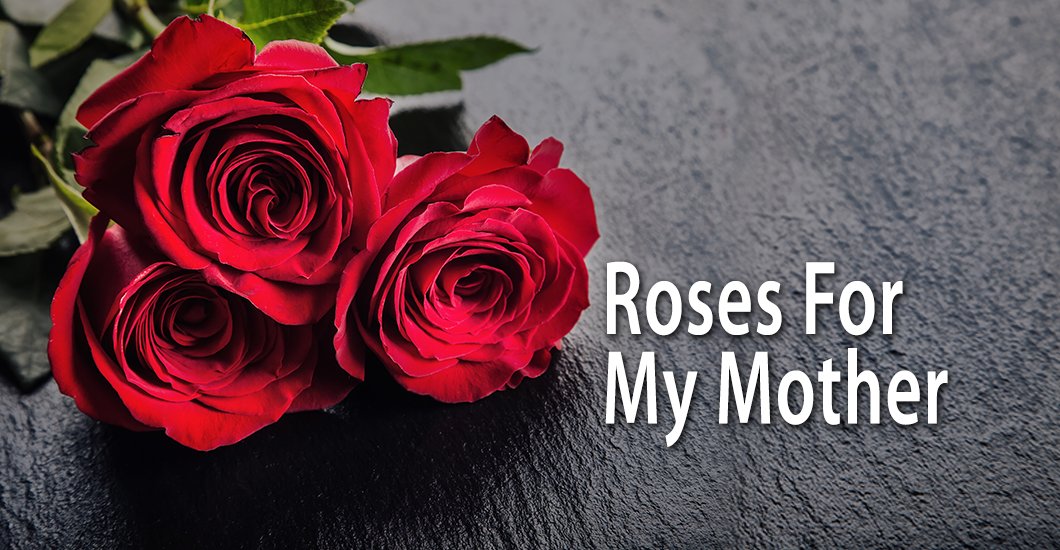
Amidst the noise of the hammers, the cries of the two thieves fastened to their Crosses, insulting speeches of the Pharisees and shouts of drunken executioners—a sudden darkness diffused at Mount Calvary. The change was gradually coming over the face of nature—a looming darkness increased with passage of time. Stillness reigned around the Cross. Jesus hung upon it all alone. As darkness continued to grow denser, the silence became perfectly astounding. Mary stood by the Cross. Her countenance was wan and pale, her eyes red with weeping. The mother looked upon her Son in agony upon the Cross, torn with compassion for the pains He suffered. Jesus looked toward His mother but He could not see her with all the blood dripping over His eyes. He was obliged to compress His eyebrows to remove the blood from His eyes. When Jesus then saw His mother and the disciple standing, whom He loved, He said to His mother: “Woman, behold your son.” Then He said to the disciple, “Behold your mother” (John 19:26).
For a long time, when I was still in the swaddling clothes of a child, I used to pester my mom about why she could not find a rare startling name of a saint for my baptism. Why of all the numerous benevolent names of angels and saints, was I given the name “Mary” which turned out to be the most common. Little did I know how great a name I had received in baptism, until I met a pious sister. She had a kind smile on her face and after praying for me, the religious said, “O my child! Jesus loves you very much! He is right here in your heart … But why do you neglect praying to His mother … the Blessed Mother of God is sorrowful because you seldom talk to her!”
This was true … Though I am a born Catholic, as a child I resorted to Jesus in everything. When I happened to glance at the image of dear Mother Mary, I thought with childish simplicity, “Well, I have already told Him.” The words of the religious struck my heart. From then on, I began to think about the Holy Mother of God.
My prayer to know her more was answered with the arrival of the International Pilgrim Virgin Statue of Our Lady of Fatima at our parish. The world-famous statue was sculpted based on the description by one of the three young seers. So great was the enthusiasm when this manifest unveiled before our eyes and I was transfixed by the look of longing on her face. It was as if she was emanating a sweet call of love. The words of Our Lady “Pray the Rosary every day to obtain peace for the world” touched my heart. Moved by her love, I took the Rosary in my hands. With the help of a Rosary prayer card (until then my mom never taught me the Rosary, saying you have to grow older to pray it well) looking at prayer marked on each bead, I began slowly to recite my first Rosary. It was really tedious, stretching to one whole hour of patient recitation. But when I put the sign of the cross to complete the Rosary, the peace that filled my heart was indescribable. I could feel the depth of the words “peace that surpasses all understanding.” Looking up with a grateful heart at the statue of Our Lady of Fatima, I closed my eyes and then I saw a big garland of blood red roses suspended in air. Suddenly it dawned on me! The Rosary I prayed is now a beautiful garland of red roses for Mother of God! I could see the Holy Mother adorned with the blooming crown of roses and my joy knew no bounds. Replenished with a greater zeal, from then on praying the Rosary turned into a daily habit. Weeks after this incident, during a retreat the priest spoke about the Rosary like this, “Each Hail Mary is a rose. By praying the Rosary, we make a beautiful crown of roses for our dear mother.” This was a confirmation of what I saw! It was not a dream or my imagination.
Little by little, the dawn of realization came upon me. She indeed is my mother. Upon the Cross, when He said, “Behold, your mother,” Jesus really gave us His own mother. Those of you reading this may be wondering how the Mother of God can be your own mother. Some of you might have lost your mother or been separated from her in the tumult of divorce, others may be taunted with less caring and understanding mothers. Yet to all, Mary is our mother. With a love deeper and vast beyond our measure, she cares for each of us individually as our spiritual mother. As Saint Louis de Montfort says, “While on earth, we are hidden in Mary because we are formed by the Holy Spirit, in her, at the likeness of Jesus. We are indeed enclosed in her womb.”
Whatever problem we place through the Rosary before the Blessed Mother Mary, it is sure to obtain a solution. Many times the Blessed Mother has bestowed the grace of a sweet fragrance while praying the Rosary. At first I never noticed, but later I found this feeling is really a sign of her tender love. It is not by the greatness of our prayer or sacrifice, but by her unfathomable motherly love that she enfolds us into the merciful love of God. The Rosary may seem like an insignificant thing in light of the evils in today’s world, but it is the weapon given to us by Our Lady. It is like the slingshot of David that killed the mighty enemy. He who prays the Rosary has the power of God in his hand. Oftentimes, when feeling less fervent, one is tempted to stop praying the Rosary. No matter how great the distraction, Our Lady merely asks our cooperation and she will do the rest.
Once I heard from the sermon of a priest that Mary experienced all the pain and sufferings of Jesus in the same measure or even more in her heart. But I could not accept that Mary suffered as much as Jesus suffered in the passion. How can that be? Yes, she is the mother of Jesus but how could we compare what Jesus suffered both interior and exterior as being felt the same by Blessed Virgin Mary. As a mother she would be crushed in heart to see the sacrifice of her only son on the Cross. But all the blows, insults, piercing of hands, the torturing death inflicted on Jesus—how can we equal their sufferings?
This curious question was answered when my baby came into this world at barely six months of pregnancy. I had to see my tiny little one strapped on all fours with cannulas and put through a lot of needles to inject medicines or draw blood every hour—she was literally trapped in a torrent of winding tubes. As I stood next to her, watching her wrenching in pain at the slightest prod, I realized that I experience her pain a hundred-fold. Then I thought of our most Sorrowful Mother. I understood then the pain which the Holy Virgin endured as the passion of her Son exceeded all the pains which a human heart can endure. As Mother’s Day is celebrated during the month of May, we Catholics dedicate May as the month of Mary. “May Crowning” marks a new spiritual season. It is a time of the year when abundant graces are poured out generously from heaven. Let us fervently recite the Rosary to make a beautiful crown of roses for our dear Mother. Let us remember that it was the Blessed Mother herself who gave us the Rosary. She merged every drop of blood that fell at Calvary together with all the tears she shed following Jesus through His agony, passion and death to form the Rosary in our hands.
Prayer:
O most blessed Virgin Mary! Holy Mother of God! Glorious Queen of heaven and earth! Accept the offering I present thee in the month of May, specially dedicated to thee. Receive me, O Mother of Mercy, among thy most beloved children; obtain for me a place in the Heart of Jesus. May my heart burn with the love of thy Divine Son, and of thee, His Blessed Mother, not for a month alone, but for time and eternity; O Mary, the refuge of sinners! Grant me a Mother’s blessing and a Mother’s care, now, and at the hour of my death. Amen.
'
Dear Lucy, I have been thinking, pondering a most riveting question that you asked awhile back: “Why do you like to go to Mass?” I want to amend the unmemorable answer I gave you back then, by telling you a little story. Here goes.
I was thirty-something and becoming disturbed because answers I thought I had were slipping away. Although my work life had been successful enough, a devastating break up had left me confused about the meaning and purpose of my life. A battle I had waged for years was escalating: my weight was surging out of control. Failed attempts to diet and exercise plunged me time and again into a cycle of obsession, self-pity and compulsive binging. Anguished and defeated, I hated myself. I felt ugly. I isolated myself behind self-help books and walls of fat, sharing my inner world with no one. In my darkest moments I wished I was dead.
A woman at work mentioned her own battles with food and we would commiserate. Then, she started to attend a recovery group. She told me of their holistic approach—they asserted that disordered eating was related to our emotions and spirituality and that all three must be addressed together. This resonated with me, so, overcoming my considerable skepticism, I, also, began to attend the meetings.
I was baffled yet captivated when I heard those people speak about God, like He cared about the nitty-gritty and the miseries of their lives. Faith, they believed, was meant for every day, not only for church on Sunday. One woman claimed that she experienced God as a benevolent coach. Moment by moment she could count on Him to provide the exact support or challenge she needed in order to achieve her personal best. Her experience seemed genuine and I was definitely intrigued. But what did it have to do with me? I knew God was much too busy to notice me weep when I could not find a single pair of pants that would zip anymore. He was obviously too far away to be bothered when I threw myself into yet another round of binging and despair.
To me, God was remote. With my life in that kind of turmoil, I barely gave Him a thought. I was down to attending Mass only about twice a year and then only to mollify my parents. Yet during those meetings, something had begun to stir deep within me—a yearning, a kind of homesickness. Hope had begun to flicker ever so dimly in my soul.
My weight began to drop a bit as changes in my daytime eating habits paid off, but an obstacle still loomed. Starving every day when I got off work at 5:00 p.m., I would inevitably start stuffing my face, plunging again into that compulsive and deadly cycle of mental, emotional and physical hell. This went on for weeks. Finally, the strangest thought penetrated my hopelessness: if I started going to daily Mass at 5:15 p.m., I could at least postpone the hemorrhage of nightly binging, thereby reducing its duration by one hour. In that moment, an invisible door opened before me. Oblivious to the glory that lay ahead, I stepped through.
Now, fast forward some years. My experiences with that group launched me into a new life. Gradually, I lost weight and kept it off. I stopped binging and am able to enjoy all foods in moderation. Wounds that once drove me to seek comfort in food were healed. I began to live the supernatural life for which we were all created, as I exchanged my childhood faith in a distant God for friendship with Jesus.
I found He loves me even when I am a mess. He picks me up when disappointment flattens me and puts me back together when I am crushed. He sorts me when I am running in too many directions, and makes a way when I see no way. He helps me forgive so I do not poison today with baggage from the past. He is a rock of truth when deceptive voices howl in my ears. He never gives up on me or throws me out to fend for myself. When I do get derailed, He reminds me that this life is only a flash and eternity is my enduring destination.
When I think back, I know for sure He was looking for me, even when I was not looking for Him. Once I began putting myself in places where He could get my attention, He welcomed me as I was and led me on from there. My progress, of course, required effort and continues to do so. What helps? Baby steps. Spending significant time with people who intentionally pursue what really matters. Asking for help when I need it. Trying out others’ suggestions now and then, instead of doing everything my way.
So thank you, Lucy, for asking, “Why do you like going to Mass?” Without answering directly, I hope these bits of my “inside story” (replete with pits and valleys, mysteries and supernatural wonders) have given you food for thought. Faith is a definitely a big subject. Where do you want to take it from here? Let us keep this conversation going. Tell me, what is your next question?
'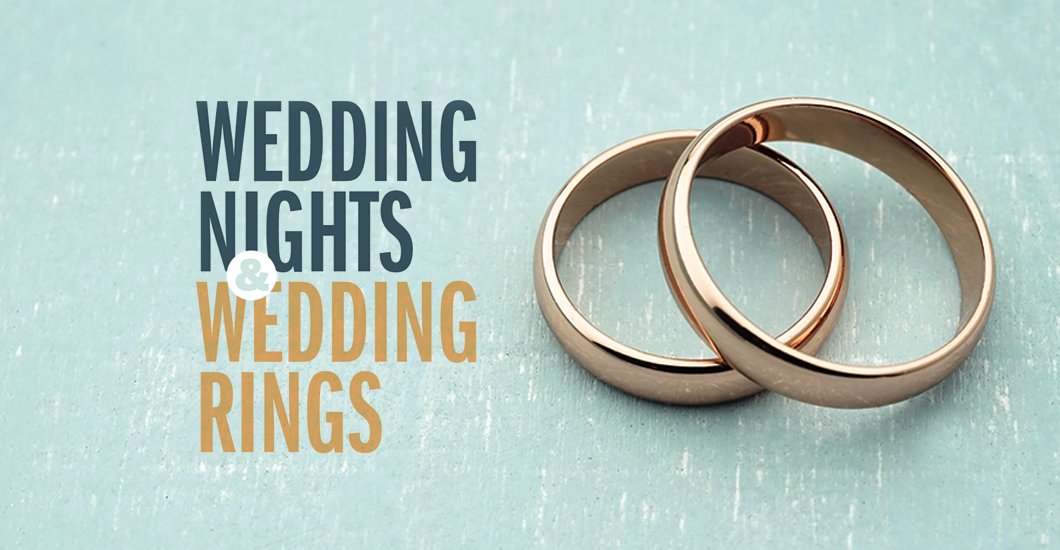
Anyone who has walked the road can tell you…saving sex for marriage is a challenging journey. You can listen intently to people who say it is worthwhile and read all about it and see some concrete fruits of it in your dating relationships, and believe wholeheartedly that it will all have been worth the wait if you enter into a new life with a carefully chosen spouse. Everyone who makes this choice makes it for a different reason… some make it for reasons based on faith, some people make it for health reasons, and some people recognize the many benefits outside of faith that come along with such a commitment. Whatever the rationale behind the choice, it is a challenging journey filled with tough decisions, hard conversations, and plenty of snide commentary and patronizing remarks.
This decision, however, is not like other tough long-term decisions. Consider a weight loss journey—when you decide to lose forty pounds—you work off ten and you can feel yourself thinking, “Wow! This is worthwhile. I’m going to keep at it even though it’s really tough.” When you have tangible proof that every little hard choice of healthy eating and exercising has made a difference within days or weeks, it makes it easier to press on.
But the commitment to save sex for marriage is not like a weight loss journey, or paying off your graduate school loans little by little and watching the dollar amount go down. There is no way to really know in the thick of it just how worthwhile it will be to endure all the name-calling and laughter in a world that tells you sex is as casual and commonplace as ordering a pizza.
I have walked the road with all it entails. This is what I have learned; I want to share it with you from the other side.
Saving sex for marriage is worthwhile because the day after your wedding night you see this ring on your left hand. I picked a sparkly double row diamond band and he chose a white gold pipe cut band. We shopped long and hard to find the perfect ones.
There is a common misconception about wedding rings, and I know this because I am a woman who has been in conversations with groups of friends about attractive men observed in public—women trying to check to see if he has a ring. When they see the ring on his left hand flash by: “Darn it, he’s married!”
Here is the thing, though—this ring does not just mean that he is married. His ring is a sign that a woman promised her life to him. The ring is a sign of her promise, not his. The one she wears is the sign of his promise. As he puts the ring on her hand, he says to her, “I give you this ring as a sign of my love and fidelity.” So when you see a wedding ring on someone’s hand, it is a concrete sign that there is someone, somewhere in the world who promised to love that person forever.
On New Year’s Eve 2015, I woke up with a sparkly wedding ring on my hand. The day before, my spouse had placed it on my hand and promised to love me—in good times and bad, in sickness and in health, for all the days of his life. Waiting until that ring was on my hand to give my virginity to a man was the best decision I have ever made (other than my decision to follow Jesus, of course).
Why? Because this ring did not leave any room for worry. This ring eliminated any possibility of regret, panic, or fear. This ring made it impossible for me to worry about what would happen next. It eliminated the questions that can fill people’s heads after sex with a stranger, with a boyfriend or girlfriend, with a friend: Will he call? What is she thinking? What did I just do? Are we now in a relationship? What happens now? What if someone finds out? What if I get pregnant? Should I feel guilty?
This ring on my hand was the assurance that none of those questions were necessary. This ring meant he would call. It meant that he would still be around in three weeks, six months, and five years. It meant that if I got pregnant, he would be right beside me for every moment of the pregnancy, of raising a child, of seeing that child into adulthood. It did not leave any room for feeling guilty, sad, regretful, or scared. It only made way for feelings of deep joy, peace, and the knowledge that I am loved—all of me—exactly as I am.
Do not let anyone convince you otherwise.
Waiting until that ring is on your hand is the best thing you could ever do for your current self, your future self, and your future marriage.
It is a worthwhile decision to save sex for marriage—whether you ever end up getting married or not. And even if you have not waited until that ring was on your hand, you can decide to begin anew today. I have countless friends who came to an impactful day in their lives when they decided that, “From this day forward, I will wait for my husband or wife.” Do not underestimate the power of our good God who promises to make all things new.
My friends, there is often great difficulty in making commitments which uphold our dignity, worth, and value—these resolutions consistently go against everything the culture proclaims from the rooftops about who we are and what is good and what love is. But these are the decisions which bring about true fulfillment, lasting peace, and authentic love. These are the decisions you will never regret. These are the decisions which made our wedding night beautiful.
'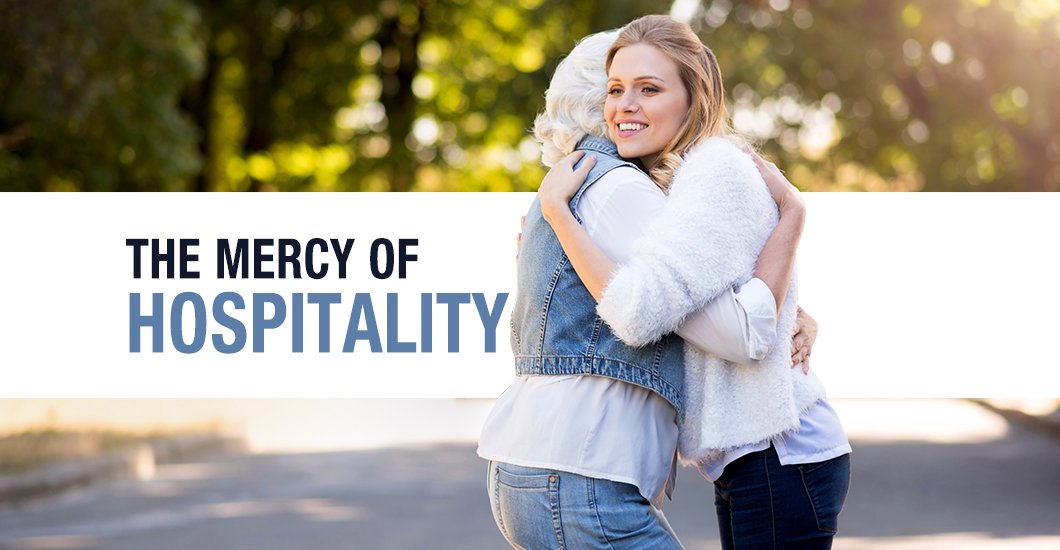
Travel to any community in the country and you will likely find motels, hotels and restaurants that are happy to provide you – for a price – a room for the night or a hot meal. So extensive is the modern hospitality industry that some schools even offer degrees in managing these services. It is all a very convenient and useful social good.
Traditionally, however, the concept of hospitality has had a rather different meaning, one that did not involve the payment of money in return. This older concept of hospitality, observed in many cultures, more resembled the gratuitous reception that is given now to family, friends, neighbors, co-workers and other guests.
On this smaller, more personal level, it is an almost ingrained ethic today to ask a visitor – whether in the home or the office – “Welcome. Would you like something to drink? Something to eat?” A good host wants his or her guest to be comfortable. We open our homes also for holidays, parties, graduations, funerals, and we host wedding receptions, offering food, drink, sometimes entertainment or a place to stay, and just as important, camaraderie.
Mothers and grandmothers are especially renowned for their hospitality, not only to their own family members, but to others as well. How many of us remember going to a friend’s house when we were growing up and being asked if we were staying for dinner?
This hospitality extends outside the home as well, expressed in etiquette and social conventions of holding the door for others, giving up your seat to a pregnant woman or older person, offering a portion of your lunch to someone who has none. Our parishes too should be places of warm welcome and sustenance. In these small ways, these small mercies, we help make the world a little bit better.
This attitude of hospitality and warm welcome, sometimes expressed as, “Mi casa es su casa – My house is your house,” was in older times even freely extended to complete strangers and travelers, rich and poor alike, including foreigners. Before the age of interstate highways and pervasive hotels and restaurants, it was understood to be a vital social virtue, religious ethic and moral duty for both the elite and common people to open their doors and show generosity and courtesy to those away from home and widows and orphans too. Of course, the clergy and monasteries of the Church opened their spiritual homes as well to provide hospitality to people in need.
The roots of this hospitality go back to the ancient world. Particularly in places like the desert regions of the Middle East, access to water, food and shelter was a matter of life and death for a traveler. God in his mercy had provided these necessities to his chosen people and so he instructs them, “You shall treat the stranger who sojourns with you as the native among you, and you shall love him as yourself, for you were strangers in the land of Egypt” (Leviticus 19:34). The Lord commands this kindness be show to even foreigner travelers despite foreign domination being a constant prime concern of Israel.
Holy Scripture provides an example of the hospitality we should practice when the Lord appeared to Abraham in the form of three men. Abraham waited on this manifestation of the Trinity, providing food, shelter from the hot sun, and water for the three visitors to wash their feet. The Lord then blesses Abraham and his wife Sarah with a son in their old age (Genesis 18:1-16). In the First Book of Kings, we read how the widow Zarephath received the prophet Elijah and, even though she was in dire straits with her food nearly gone, she gave him a portion. Again God gives his blessing – Zarephath is given enough food to survive and when her son dies, the Lord restores him to life (1 Kings 17:8-24).
“Do not neglect hospitality, for through it some have unknowingly entertained angels,” we are told (Hebrews 13:2). Having been received in mercy by the Lord, hospitality is among the essential qualities that he expects of his good and faithful people, including concern not only for family and friends, but for those we do not know, for domestic travelers, foreign immigrants and refugees, and for all who are downtrodden, vulnerable and marginalized.
Whether it is in the home, at work, in the Church, or in our nation, as a matter of justice and gratitude for what we have been given, we are called to be welcoming and hospitable to others. By these acts of gratuitousness, we help build up the kingdom of God.
'
For years I lived a life that was not very healthy. I am not talking about bad food and little exercise. I mean, sure, there is that, but that is not where I am going with this. What I am talking about is that I was leading a life that was not very conducive to maintaining a healthy soul. Although, we can use as a comparison consuming unhealthy food and drink: when we tend to over-indulge in too much red meat, too much sugar, or too much alcohol, the negative side effects creep up on us, and soon enough, start to take their toll.
Likewise, other things we put into our minds and into our hearts also tend to take their toll on our interior. Treasure that is not perhaps real treasure.
We Become What We Consume
We basically become what we consume on a daily basis.
Just as how we tend to become unhealthy if we eat too much unhealthy food, this is also true in regards to the shows we watch, the books we read, the music we listen to, and the Internet we often spend countless hours on. All of this, our supposed treasure.
Each of these things, often without our direct knowledge, will begin to shape our minds and our hearts. And this is very important.
Just as we often in life make a decision to eat healthier, or walk more often, perhaps we should also take a time out to determine if what we are feeding ourselves on a daily basis—the non-food type of consuming—is what is best for us.
Is playing video games for a couple hours each day serving us well? Is spending over an hour each day reading status updates on Facebook helping us to be better people? Is watching and reading the mainstream news creating negativity in our lives? Is caring about which celebrities are dating doing anything to improve our lives?
I cannot answer those questions for you, but I can speak from my personal experience.
About twelve years ago, I moved into my current home. Because I spent so much time in front of the television in my previous apartment, I decided that for my new life in my new home, I would have no television. After a couple of months without it, a surprised friend of mine asked me if I missed watching TV.
The answer was no.
Treasures Realized
I realized that my life had drastically improved without television. Instead of staring at a box all morning and evening, watching shows that had no positive impact on my life, I was actually doing things that did have a positive impact.
I was reading more. I was spending time with friends and family. I was outside planting a garden. I was learning more about my faith.
I was living.
And broadcast television has never made an appearance back into my home since. I also unsubscribed to many of the magazines I was receiving, especially those filled with news (world and entertainment), and those that promoted superficiality. I stopped caring about trends—what other people thought was important, and started caring about what was good for me. I developed a “less-is-more” way of thinking (except for my garden perhaps!).
And with all these time-consuming things now removed from my life, I attempted to give more time to things that matter, especially in my relationship with God.
Now, with that said, that does not mean that I have given my heart perfectly over to things that truly matter. I continue to be a work in progress. I fully admit that I allow too much social media into my life. And I am not exactly sure why. Unless finding out what burger my friend had for lunch (and snapped a picture of) is somehow beneficial to my life.
And I am working on this. I am purposely spending far less time on Facebook and Instagram. I am rarely on Twitter anymore, and I am about ninety percent ready to shut down my Twitter account entirely. And as for all the other social this-or-that apps out there, I have made a promise to myself to never start using them.
But everyone is different. Some people may not even use social media, or are great at limiting themselves to only perusing social sites for a few minutes a day.
An Honest Assessment of Our Treasures
Each person must ask themselves: what am I giving my time to? My heart to? My soul to? And the most important part of this evaluation: you have to be honest with yourself.
As human beings, we were created to worship. Everyone has chosen his own path. Those who choose to worship God give their hearts to Him and let everything else take a second, third, etc. place. Those who choose not to worship God will worship something—always. It could be their car, sports, a person, a pet—the list goes on.
Where your treasure is, there also will be your heart. What are you giving your heart to?
Where Is Your Treasure?
If you immediately start to defend the time you spend on certain aspects of your life, the exercise is futile. You must go deep into your heart for the answer. And by doing this, you can bring about positive changes into your life that you never imagined, or even thought possible.
Always choose carefully what you surround yourself with. The changes you make might just change your life.
'